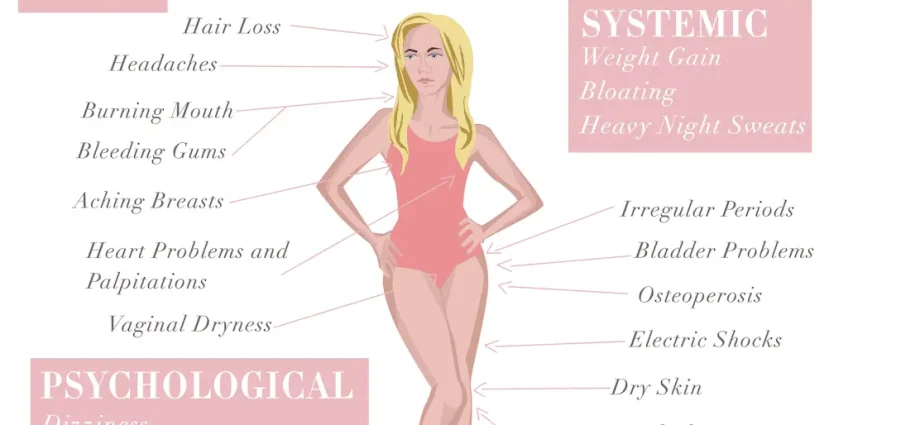The symptoms of menopause
The symptoms are usually more marked during the perimenopause. These symptoms are related to hormonal changes that occur during this transition period, but also to aging. They appear unpredictably and vary a lot from month to month.
- Irregular periods. They are a common manifestation of the hormonal instability that occurs during perimenopause.
- Hot flashes and night sweats. Hot flashes are usually felt first in the abdomen or chest. The heat rises in seconds to the neck and face. Their duration varies from a few seconds to a few minutes. Their frequency and intensity vary greatly from one woman to another. They are sometimes accompanied by palpitations and sweating. 50 to 80% of women feel it. Hot flashes are the main reason women seek medical attention during menopause.
- Night sweats : they are characterized by heavy sweating throughout the body. They occur at night and can interrupt sleep. The important thing is to ask whether hot flashes and night sweats adversely affect quality of life enough to require treatment.
- Sleep disturbances. Sleep problems are a very common complaint during this time of transition. In general, with age, the nights are shorter and the quality of sleep tends to be poorer. Hormonal changes can also interfere with sleep. For example, difficulty falling asleep and frequent waking up during the night are usually related to hot flashes and night sweats. These sleep disturbances can lead to severe fatigue, irritability, mood swings and difficulty concentrating.
- Mood disorders. While this remains controversial, the period around menopause appears to be a time of greater emotional vulnerability. Irritability, the tendency to cry more often, mood swings, anxiety, and lack of motivation or energy are the most common annoyances reported during this period of life. Women who suffered from depression before menopause also sometimes see their symptoms worsen.
- Decreased libido. Sexual desire is a complex human phenomenon which, on the hormonal level, depends above all on sex hormones: estrogens and androgens (testosterone and dehydroepiandrosterone or DHEA). According to the results of a large study of women going through menopause, libido and sexual arousal tend to decline over the years. For more information on sexuality with age, see our Sexuality section.
- Dryness of the mucous membranes. Stopping the secretion of estrogen by the ovaries decreases the production of mucus in the vagina and bladder. This drop in production leads to the drying and thinning of the mucous membranes. In addition, vaginal secretions change: they become more watery and more alkaline (less acidic). More than half of postmenopausal women experience discomfort related to vaginal dryness. These discomforts are manifested by itching, a burning sensation in the vagina and on the vulva and pain during sex. This dryness of the mucous membranes does not present a health risk. There are solutions to relieve the discomfort it causes.
- Aging skin, drier hair. The skin tends to become drier, and the wrinkles, more pronounced. The hair becomes drier and more fragile. This is because the drop in estrogen leads to a reduction in the production of collagen and D’elastin, 2 substances which play an important role in the elasticity of the skin as well as in its tone. However, the main causes of the appearance of wrinkles remain time (aging) and cumulative exposure to the sun. In addition, other factors can change the appearance of the skin and hair, such as slower activity of the thyroid gland (hypothyroidism). We must therefore assess the overall situation.
See our Skin Aging and Dry Skin fact sheets.
Symptoms of menopause: understand everything in 2 min
- Slight weight gain. Women who gain 2 to 4 kg (5 to 10 pounds) during menopause are said to remain healthy longer and survive longer than those who do not gain, lose or gain more weight. Fat cells convert adrenal hormones into female hormones. A slight weight gain, because it attenuates the hormonal drop during menopause, therefore seems beneficial for health.










